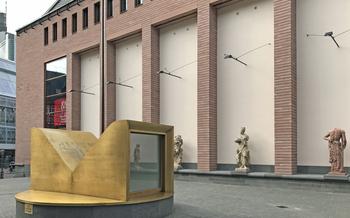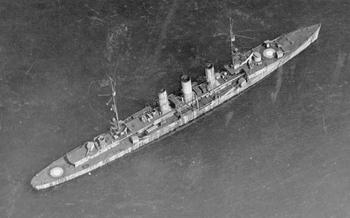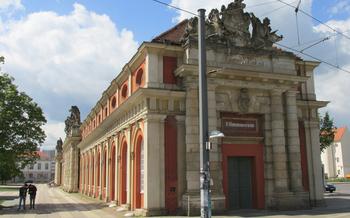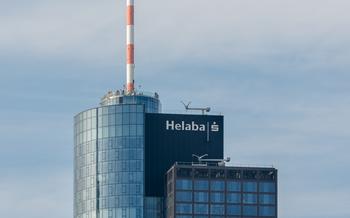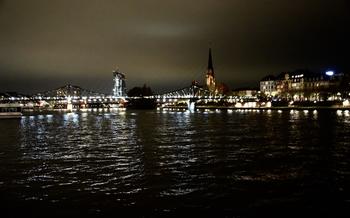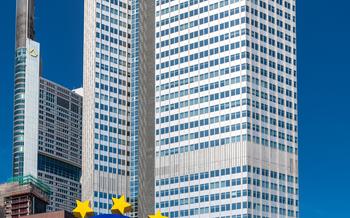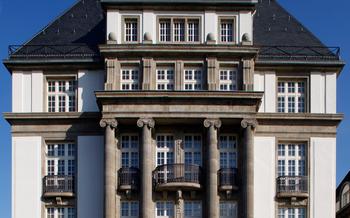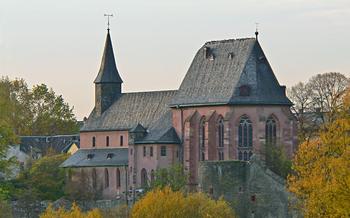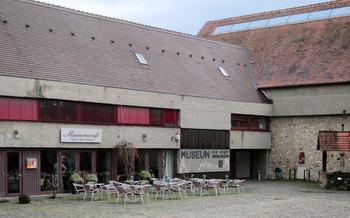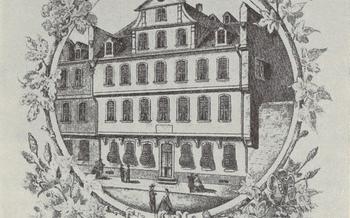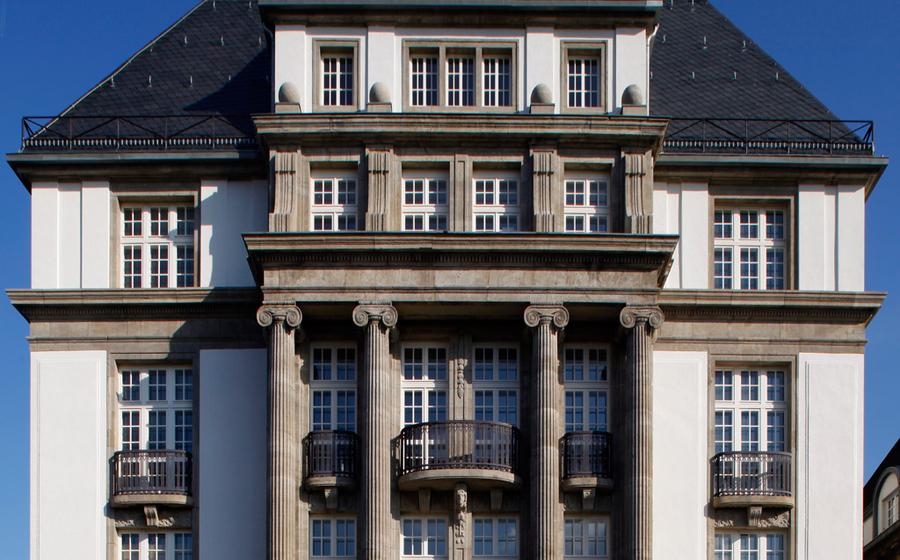
German Film Museum
- The German Film Museum: A Journey Through Cinema History
- Exploring the Permanent Exhibition
- Immerse Yourself in Film Technology
- Discover German Cinema's Golden Age
- Post-War German Cinema and New Wave Movement
- Contemporary German Cinema: A Global Perspective
- Special Exhibitions and Events
- The Museum's Archive and Research Center
- Educational Programs and Workshops
- Accessibility and Visitor Information
- The Museum's Stunning Architecture
- Nearby Attractions and Points of Interest
- Tips for Photography Enthusiasts
The German Film Museum: A Journey Through Cinema History
Nestled in the vibrant city of Frankfurt, the German Film Museum stands as a testament to the rich cinematic legacy of Germany. Established in 1984, the museum has evolved into a renowned institution dedicated to preserving, showcasing, and celebrating the art of filmmaking.
The German Film Museum's impressive collection encompasses over 260,000 artifacts, including vintage cameras, projectors, costumes, props, and posters. These artifacts provide a tangible connection to the evolution of German cinema, from its humble beginnings to its global impact.
Located in the heart of Frankfurt's Museumsufer, the German Film Museum is easily accessible by public transportation. Its central location makes it an ideal starting point for exploring the city's vibrant cultural scene.
Exploring the Permanent Exhibition
The permanent exhibition at the German Film Museum takes visitors on a chronological journey through the history of German cinema, from its humble beginnings to its rise as a global powerhouse. Highlights include rare and iconic artifacts, such as the camera used to film the first German feature-length film, "The Student of Prague" (1913), and costumes worn by legendary actors like Marlene Dietrich and Emil Jannings.
Interactive displays and multimedia presentations bring the exhibits to life, allowing visitors to experience the magic of filmmaking firsthand. Learn how early filmmakers created special effects without the aid of modern technology, and try your hand at editing a film clip using professional software. Guided tours and audio guides in multiple languages provide in-depth insights into the exhibits and the stories behind them.
Immerse Yourself in Film Technology
At the German Film Museum, you'll have the chance to delve into the fascinating world of film technology. Explore a captivating display of vintage cameras and projectors that have shaped the evolution of filmmaking. From early hand-cranked models to state-of-the-art digital equipment, these exhibits showcase the remarkable advancements that have revolutionized the way movies are produced.
Enhance your understanding of cinematography with interactive exhibits on sound design and editing. Discover the secrets behind creating immersive soundscapes and the art of editing that brings films to life. Immerse yourself in the technical wizardry that goes on behind the scenes, from capturing the perfect shot to crafting the final cut.
Discover German Cinema's Golden Age
In the 1920s, German Expressionism emerged as a groundbreaking movement that transformed the landscape of cinema. Films such as "The Cabinet of Dr. Caligari" and "Nosferatu" captivated audiences with their haunting visuals, distorted sets, and psychological themes. These works showcased the unique creative vision of German filmmakers, who pushed the boundaries of storytelling and artistic expression.
During the Weimar Republic era, German cinema flourished, producing iconic films that are still celebrated today. Directors like Fritz Lang, F.W. Murnau, and Ernst Lubitsch crafted masterpieces that explored social, political, and philosophical issues. "Metropolis," "M," and "The Blue Angel" are among the most notable films of this period, showcasing the diversity and innovation of German cinema.
Notable actors such as Marlene Dietrich, Emil Jannings, and Conrad Veidt brought these films to life with their powerful performances. Dietrich, in particular, became a global icon known for her glamour and charisma, epitomizing the allure of Weimar cinema.
Post-War German Cinema and New Wave Movement
The aftermath of World War II left a profound impact on German society and culture, and cinema was no exception. The years immediately following the war were marked by a struggle to rebuild and come to terms with the horrors of the past. Films of this period often reflected the somber mood of the nation, exploring themes of guilt, loss, and the search for meaning in a shattered world.
In the 1960s, a new generation of filmmakers emerged, eager to break away from the traditional narrative styles and conservative themes that had dominated German cinema. This period, known as the New German Cinema or New Wave movement, was characterized by a spirit of experimentation and rebellion. New Wave directors challenged conventional storytelling techniques, embraced non-linear narratives, and tackled taboo subjects such as sexuality, politics, and social injustice.
Key figures of the New German Cinema movement included directors such as Rainer Werner Fassbinder, Wim Wenders, and Volker Schlöndorff. Their films, such as "The Marriage of Maria Braun" (1978), "Paris, Texas" (1984), and "The Tin Drum" (1979), respectively, pushed the boundaries of filmmaking and gained international acclaim. These directors, along with their contemporaries, helped to revitalize German cinema and establish its reputation as a force to be reckoned with on the global stage.
Contemporary German Cinema: A Global Perspective
In the post-reunification era, German cinema has garnered international acclaim for its thought-provoking storylines, innovative filmmaking techniques, and exceptional talent. Contemporary German directors such as Tom Tykwer, Wim Wenders, and Maren Ade have gained worldwide recognition for their critically acclaimed films.
One of the defining characteristics of contemporary German cinema is its exploration of social and political issues. Films like "Run Lola Run" and "Good Bye, Lenin!" offer insightful commentaries on German society, while "The Lives of Others" and "Toni Erdmann" delve into the complexities of German history.
The success of contemporary German cinema is also attributed to its talented actors. Stars like Daniel Brühl, Diane Kruger, and Christoph Waltz have made a mark on the international stage with their captivating performances. These actors have not only elevated the quality of German films but have also contributed to their global appeal.
German cinema has made significant contributions to world cinema by showcasing unique perspectives, challenging conventional narratives, and pushing the boundaries of filmmaking. The success of contemporary German films demonstrates the country's enduring commitment to producing high-quality cinema that resonates with audiences worldwide.
Special Exhibitions and Events
In addition to its permanent exhibition, the German Film Museum frequently hosts temporary exhibitions that delve into specific themes or the work of renowned filmmakers. These exhibitions often showcase rare artifacts, original costumes, and props from iconic films, providing visitors with a deeper understanding of German cinema history and its global impact.
The museum also organizes an array of special events throughout the year, including film screenings, workshops, lectures, and panel discussions. These events offer opportunities for visitors to engage with filmmakers, industry experts, and fellow enthusiasts, gaining insights into the creative process and the challenges and triumphs of filmmaking.
Whether you're a film buff, a casual moviegoer, or simply curious about the world of cinema, attending a special exhibition or event at the German Film Museum is an enriching experience that will leave you with a newfound appreciation for the art and craft of filmmaking.
The Museum's Archive and Research Center
The German Film Museum boasts an extensive archive and research center, housing a treasure trove of film-related documents, photographs, scripts, and memorabilia. This vast collection serves as a valuable resource for researchers, scholars, and film enthusiasts alike. The archive is particularly rich in materials related to German cinema history, including production records, correspondence, and personal papers of renowned filmmakers.
Access to the archive is granted to researchers and scholars upon request, providing them with an opportunity to delve deep into the history and evolution of German cinema. The museum's dedicated staff is available to assist researchers in their inquiries, facilitating their access to relevant materials and ensuring a productive research experience.
In addition to its physical collection, the German Film Museum is actively involved in digitization efforts to preserve and share its vast holdings with a wider audience. Through digitalization, the museum aims to make its collection more accessible to researchers and film enthusiasts around the world, fostering a greater understanding and appreciation of German cinema's rich legacy.
Educational Programs and Workshops
The German Film Museum recognizes the importance of film education and offers a diverse range of educational programs and workshops to engage audiences of all ages. Aspiring filmmakers, students, and enthusiasts can participate in filmmaking workshops and courses designed to foster creativity and technical skills. These workshops cover various aspects of filmmaking, from storytelling and scriptwriting to cinematography and editing.
The museum also caters to younger audiences with its school programs and educational resources. Interactive workshops and guided tours introduce students to the magic of filmmaking, encouraging them to appreciate the art form and explore their own creativity. Through these programs, the museum aims to cultivate film literacy and appreciation among the younger generation, inspiring future filmmakers and cinephiles.
Accessibility and Visitor Information
The German Film Museum is committed to providing an inclusive and accessible experience for all visitors. Accessibility features include wheelchair ramps, elevators, and accessible restrooms throughout the museum. The museum also offers assistive listening devices and sign language interpretation upon request.
Information desks are located at the museum's entrance and throughout the exhibition spaces. Multilingual staff is available to assist visitors with orientation, provide information about the exhibits, and answer any questions.
To make the most of your visit, it's recommended to plan ahead and allocate sufficient time to explore the museum's extensive collection. Allow at least two to three hours to fully immerse yourself in the exhibits and enjoy the interactive experiences.
The museum offers guided tours in German and English, providing a deeper insight into the history of German cinema and the museum's collection. Audio guides are also available in multiple languages for self-guided exploration.
For those seeking further engagement, the museum organizes regular film screenings, workshops, and lectures. These events offer opportunities for interaction with filmmakers, industry experts, and fellow film enthusiasts.
The Museum's Stunning Architecture
The German Film Museum stands out not only for its rich collection and exhibits but also for its striking architecture. The building, designed by renowned architect Hans Hollein, is a masterpiece of modern architecture, inspired by the shape of a film reel. Its unique design features a curved façade and a spiral staircase that resembles a strip of film.
The museum's exterior is clad in a shimmering metal mesh, which creates a dynamic interplay of light and shadow throughout the day. The interior spaces are equally impressive, with high ceilings, spacious galleries, and carefully curated exhibits. The museum's sustainable features, such as energy-efficient lighting and rainwater harvesting, make it an environmentally conscious landmark.
As a result of its unique design and sustainable features, the German Film Museum has become a beloved landmark on the Frankfurt skyline. It is a testament to the city's vibrant cultural scene and its commitment to preserving and promoting German cinema.
Nearby Attractions and Points of Interest
The German Film Museum is strategically situated in the heart of Frankfurt, surrounded by a wealth of cultural attractions and historical landmarks. Within walking distance, visitors can delve into the world of art at the Städel Museum, renowned for its impressive collection of Old Master paintings. For those interested in contemporary art, the Museum für Moderne Kunst (MMK) offers a diverse array of exhibitions showcasing cutting-edge works.
History enthusiasts can embark on a journey through time at the Historisches Museum Frankfurt, which narrates the city's rich history from its medieval origins to the present day. The Römerberg, Frankfurt's charming Old Town square, is a must-visit, featuring iconic landmarks such as the Römer, the city hall, and the stunning Gothic Alte Nikolaikirche.
To experience Frankfurt's vibrant performing arts scene, the Schauspiel Frankfurt and the Oper Frankfurt are just a stone's throw away from the museum. These venues host world-class theater productions and opera performances throughout the year.
For those seeking a serene respite from the urban hustle and bustle, the nearby Anlagenring, a green belt encircling the city center, offers a tranquil oasis with its beautifully landscaped gardens, serene ponds, and jogging trails.
By venturing beyond the immediate vicinity of the museum, visitors can discover even more of Frankfurt's hidden gems. The Main Tower, the city's tallest skyscraper, provides breathtaking panoramic views from its observation deck. The Goethe House, where the literary giant Johann Wolfgang von Goethe spent his childhood, offers a glimpse into the life and works of one of Germany's most celebrated writers.
With its central location and proximity to a multitude of cultural attractions, the German Film Museum serves as an ideal starting point for exploring the diverse offerings of Frankfurt, a city brimming with history, art, and vibrant urban life.
Tips for Photography Enthusiasts
Aspiring photographers will find the German Film Museum a treasure trove of captivating subjects. To capture the best shots, consider the following tips:
-
Framing and Composition: Experiment with different angles to find unique perspectives. Look for leading lines, symmetry, and interesting foreground elements to enhance your composition.
-
Lighting: Natural light streaming through the museum's windows can create beautiful effects. Adjust your camera settings accordingly to avoid overexposed or underexposed shots.
-
Tripods and Flash Photography: Using a tripod can help stabilize your camera for sharp images, especially in low-light conditions. Flash photography is generally not permitted in the museum, so be prepared to work with available light.
-
Respecting Copyright: Remember that the exhibits in the museum are protected by copyright laws. Always ask permission before photographing any artwork or artifacts, especially if you intend to use the images for commercial purposes.
